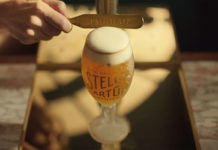Quality is crucial in the on-trade whether the mercury rises or not

WHEN the clouds vanish in Scotland, there are few things consumers in the on-trade expect more from bars than great pints in the sun.
So, given that some customers may have spent some time imagining the first sip of draught beer before they get to the pub, serving the perfect pint is vital for licensees – and that is dependent on a well-maintained dispense system.
Carl Goode, product and marketing manager at gas supplier BOC, said: “Bar managers invest a great deal of effort in getting the atmosphere and facilities just right – good quality food, top quality beers, a clean and attractive environment – but it is just as important to ensure that the beer is dispensed properly.
“In recent years, quality has become an issue for the landlord just as much as the brewer.
“The dispense process needs to deliver a consistent product every time.
“We should aim to make the pint far superior to a drink the customer could achieve at home.”
Fortunately, there are several signs licensees can look for to indicate if something in their dispense system isn’t working the way it should.
Stephen Dickson, dispense quality manager at Tennent’s, said there are some telltale signs a pint isn’t up to the standard it should be.
He said: “When analysing a pint the following factors should be considered: clarity, head retention, aroma, taste, temperature and seeding (bubble rise).
We should aim to make the pint far superior to a drink the customer could achieve at home.
“As a rule of thumb, poor clarity, aroma and taste can often be attributed to line cleanliness. Poor head retention and seeding to improper glass care.
“Dispense temperature can be impacted by a number of factors, including faulty coolers or cellar refrigeration.”
And the gas used to pump the beer through the system shouldn’t be neglected this summer, especially so when licensees consider last year’s carbon dioxide shortages, according to Goode at BOC.
He said: “[Last summer] suddenly everyone from manufacturers to customers began to appreciate the importance of dispense gases. Yet they’re still overlooked as a factor in the perfect pour.”
He also warned that CO2 leaks in a cellar can cause headaches and dizziness, even at low levels of exposure; or even, at higher exposure levels, poisoning or asphyxiation.
Additionally, there are quality concerns.
“Dispense gases put the fizz in a pint of beer, cider or soft drinks and are essential for serving drinks the way the brands intended,” said Goode.
“This benefits licensees as well. With the correct food-grade gas and the right mixture, bar staff will pull a great pint and customers will order another.
“Get the mix wrong, or use poor quality gas, and drinkers will feel as flat about your pub or club as they do about your beer. They may not come back. That’s the last thing a cost-conscious landlord wants to happen.”
Dickson at Tennent’s agreed.
He said: “It’s important that operators ensure high standards to keep consumers happy and ensure they are pouring pints at the best possible standard. Consumers will keep coming back to an outlet that they can trust.”
Staff training is essential if you want to consistently achieve quality dispense.
Ultimately, knowledge is key. And it’s not enough for the licensee to know what they’re doing in the cellar; if standards are going to be maintained, members of staff have to be able to step in.
Dickson said: “Staff training is essential if you want to consistently achieve quality dispense.
“It doesn’t matter how much dispense knowledge you have, your outlet is only as good as its weakest link. Publicans require some down time, or perhaps even a holiday!
“So it is important that a safe pair of hands is available in their absence.”
Goode at BOC also emphasised the importance of sound staff training with regards to beer dispense.
“When you teach bar staff how to pull a pint, you’ll probably cover the importance of clean glassware, chilling and the 45 degree pour,” he said.
“You might also explain why glasses are etched to nucleate the gas and generate better bubbles and which glasses are right for a Guinness versus a cider. These are all essential lessons if you want to create draught masters in pouring perfect pints and happy customers.”























